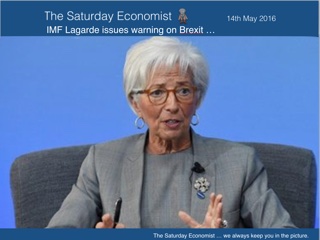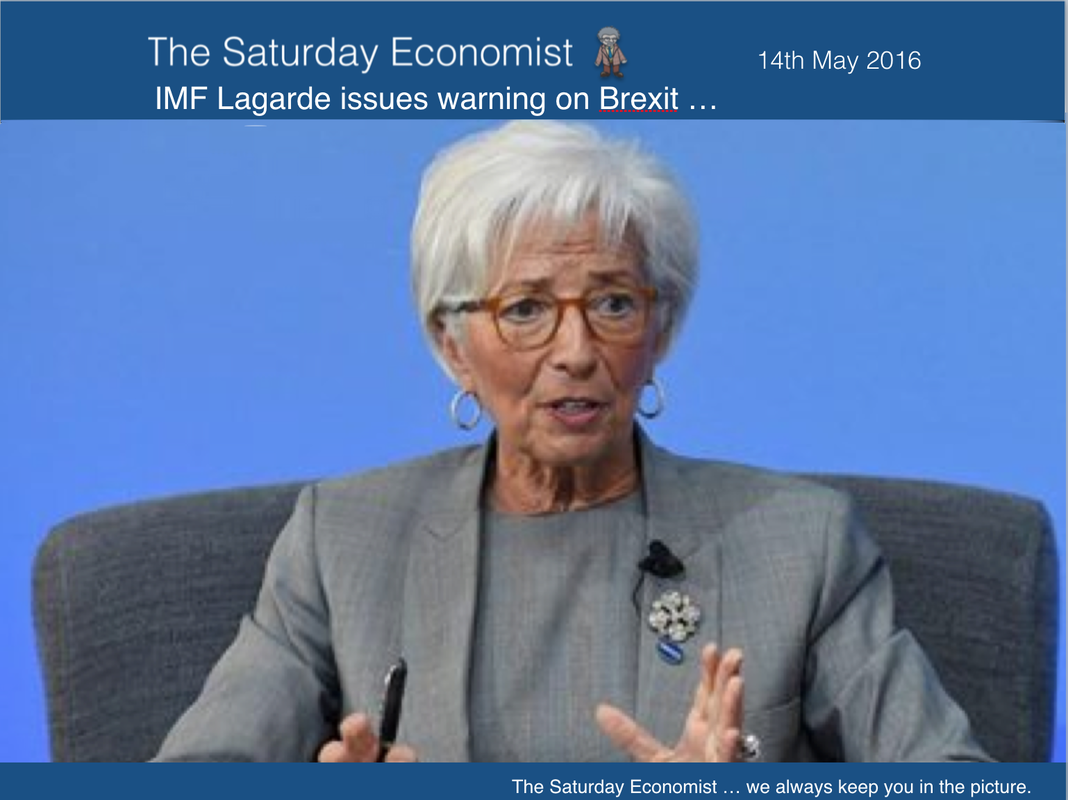 The IMF team were in London this week. Christine Lagarde warned of the dangers of leaving the EU. “A vote for exit would precipitate a protracted period of heightened uncertainty, leading to financial market volatility and a hit to output.” For sure, consumer and business confidence would be hit, damaging spending prospects and investment spending, if the decision is made to leave in June. Foreign direct investment could take a big hit, exacerbating the current account deficit and ongoing funding challenge. No time to risk a “Johnny Foreigner” gilt strike with a £1.5 trillion government debt to finance. The IMF were enjoined in the negative outlook by the Bank of England. For Mark Carney and the MPC “A vote to leave the EU could have material economic effects on the exchange rate, on demand and on the economy’s supply potential ”. NIESR produced a series of articles this week, the overall conclusion was clear “the potential downside risks of a decision to leave, while not susceptible to precise quantification, appear large”. A powerful line up for the “Remain” campaign, the IMF, the Bank of England and NIESR. So what of the “Leave” camp? … No need to worry about Brexit? … Boris Johnson and the campaign bus were in Cornwall, focusing on the export potential of asparagus and ice cream. Did you know the UK sends £350 million of asparagus each week to Brussels? I didn’t know that! Did you know the EU won’t allow bullfighters to wear high heels on work days! Shocking. And did you know the EU subsidises bull fighting? Well not really. But it’s a great headline. For sure we know the Vote Leave campaign subsidises “bull shitting”. It really is time to damp down the rhetoric if the campaign bus is to establish credibility to the debate and make any inroads into the “don’t know” camp. The voters need facts, not headlines and photo ops. This is no time for soundbites, I feel the hand of history should be held across the mouth of the ex mayor of London in the run up to the referendum. Both sides of the debate would surely benefit. The IMF argument in detail … Christine Lagarde explained that a decision to "leave" would exacerbate uncertainty and financial stability. Sterling would come under pressure, consumer and business confidence would be damaged. This could lead to a drop in household spending, business hiring, and business investment. Exports could be hit, output would fall and job lay offs would ensue. The trade deficit would deteriorate, exacerbating the current account deficit. Funding the external deficit may become a challenge, as foreign direct investment flows would diminish and hot money flows would avoid the UK. Funding the internal deficit (government borrowing) would also become more of a challenge. Borrowing would rise as a result of lower growth and national income flows. Inflation would increase. Interest rates would rise. London would no longer be the centre of finance in Europe. Frankfurt and Paris would benefit as “passporting” rules were denied to foreign banks based in London. There would be a real risk of a gilt strike, equities would fall along with house prices especially in London! It’s a gloomy outlook and it could get worse. “The Germans would take the Mini back to Munich. The Bentley would be made in Brussels and the UK would be denied access to the next round of Airbus investment.” On the other hand … it could all be alright .. We can leave the EU, shedding the yoke of EU oppression. Put an end to red tape and regulation. Reclaim our sovereignty, protect our borders. Create our own laws. Invigorate our industry. Protect our farmers, invest in the NHS the money squandered on EU contributions to grow olives in Greece and rear bulls in Spain. Protect our fishermen, build nets to stop fish swimming out of the English Channel and the North Sea. Deal with the rest of the world on the old “trade follows the flag” basis. It served us well in the past. Gunboats down the Rhine, Tall Ships Down the Seine. Civis Brittanicus Sum, that sort of thing. Realise the export target of £1 trillion within five years. Who says it could take ten years to get a trade deal with Azerbaijan? Make the message clear. The thin red line is out to do business with the rest of the world. Let the clarion call ring out … “May the sun never set on a UKTI trade mission”. Yes "Vote Leave" on June 23rd. Blue Skies await, forget the factual debate. You know it makes sense, We think you’re all dense. Together We can Make Britain Great again. So what of rates? The Bank of England reduced the central forecast for growth to just 2% this week with inflation set to return to target within a two year period. The MPC were unanimous in holding rates this month. There was no clear indication of the rate rise timing. In the US, the Fed is still expected to increase rates this year, with one or two rate hikes remaining a possibility but not in June. In the UK, wage growth and headline inflation will provide the triggers to action with no rate rise expected ahead of the referendum in June. We still expect UK rates to be at least 0.75% by the end of the year, with two rate hikes to 1% a further possibility. Oil Brent Crude closed at $48 this week. The outlook for inflation will look remarkably different by the end of Q3 this year. So what happened to Sterling? Sterling closed down against the Dollar at $1.437 from $1.445 but up against the Euro at €1.271 from €1.266. The Euro moved down against the Dollar to 1.130 from €1.141. Oil Price Brent Crude closed at $47.76 from $45.44 The average price in May last year was $64.08. Markets, were transfixed - The Dow closed at 17,604 from 17,603. The FTSE closed at 6,138 from 6,104. Gilts - yields moved slightly. UK Ten year gilt yields closed at 1.44 from 1.44. US Treasury yields moved to 1.73 from 1.74. Gold closed at $1,273 from $1,287. That's all for this week. Don't miss Our What the Papers Say, morning review! Follow @jkaonline and download The Saturday Economist App! Our review of the Brexit facts and figures out now! Download Here! John © 2016 The Saturday Economist by John Ashcroft and Company : Economics, Corporate Strategy and Social Media ... Experience worth sharing. The material is based upon information which we consider to be reliable but we do not represent that it is accurate or complete and it should not be relied upon as such. We accept no liability for errors, or omissions of opinion or fact. In particular, no reliance should be placed on the comments on trends in financial markets. The receipt of this email should not be construed as the giving of investment advice.
0 Comments
Leave a Reply. |
The Saturday EconomistAuthorJohn Ashcroft publishes the Saturday Economist. Join the mailing list for updates on the UK and World Economy. Archives
July 2024
Categories
All
|
| The Saturday Economist |
The material is based upon information which we consider to be reliable but we do not represent that it is accurate or complete and it should not be relied upon as such. We accept no liability for errors, or omissions of opinion or fact. In particular, no reliance should be placed on the comments on trends in financial markets. The presentation should not be construed as the giving of investment advice.
|
The Saturday Economist, weekly updates on the UK economy.
Sign Up Now! Stay Up To Date! | Privacy Policy | Terms and Conditions | |

 RSS Feed
RSS Feed